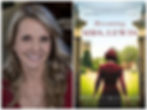‘Becoming Mrs. Lewis’ a departure for author Patti Callahan Henry
- Patti Callahan Henry
- Feb 24, 2019
- 4 min read
Historical novel tells C.S. Lewis’ love story from his wife’s perspective
New York Times best-selling author Patti Callahan Henry didn’t intend to break rank with her new book, “Becoming Mrs. Lewis.” She already has a good thing going with her run of 12 novels in 13 years, each one a textbook example of Southern contemporary fiction revolving around a woman navigating family life and romantic relationships in evocative settings such as Savannah and coastal South Carolina.
Granted, some of her books had kernels of truth to them. “When I Found You” from 2013 is about a woman who places a child in adoption and reconnects with her later in life. Henry has openly talked about her sister being the inspiration for the story.But when Henry, 54, began reading about Joy Davidman, she promptly fell down a rabbit hole.Davidman was the wife of Oxford professor C.S. Lewis, author of “The Chronicles of Narnia” and “The Screwtape Letters.” She was a writer, too, and a considerable influence on Lewis’ work. But her writing was greatly overshadowed by his. “It wasn’t a deliberate departure,” said Henry, speaking of her new book from her home in Birmingham, Ala. “I just wanted to know this woman. The more I found out about her, the more I wanted to know, and the more I loved her.”
And that’s how Henry came to write a novel of historical fiction set in the 1950s. “Becoming Mrs. Lewis” starts with Davidman’s abusive marriage in upstate New York, where she struggles to find time to write while taking care of two young sons and an alcoholic husband. When her conversion to Christianity prompts her to begin a correspondence with Lewis, a well-known Christian apologist, a friendship forms, leading Davidman to visit him in Oxford, England, and the rest is history.
Henry’s intention to switch literary genres may not have been deliberate, but it was dramatic as far as the publishing world was concerned. So much so, that she had to go with a different publisher. Harper Collins is publishing “Becoming Mrs. Lewis,” while Penguin publishes her contemporary fiction. She also had to alter her name, dropping her married surname, Henry, for the new release. “That’s as far as I was willing to go,” she said, adding emphatically that the name change does not indicate a change in marital status. She’s still happily wed.
Henry will launch the book with an appearance at the Atlanta History Center on Oct. 2, which is also publication day and the due date for her first grandchild. After the event, she will head to Hawaii to spend time with her daughter, son-in-law and the new addition to their family. Henry also has two sons who are in college.
‘Becoming Mrs. Lewis’ by Patti Callahan. Contributed by Harper Collins
One of the things that sets Henry’s book apart from other books and movies about the Davidman-Lewis union, said Henry, is that “Becoming Mrs. Lewis” is told from Davidman’s point of view, not Lewis’.
“Everything that’s been written has been about her, not from her,” said Henry. “I wanted to tell her story from behind her eyes.”To do that, Henry immersed herself in Davidman’s letters, journals and poetry. And she traveled to most of the sites Davidman visited on that fateful trip to Great Britain.“I’ve always done research,” she said. “I was originally a research nurse. I love that aspect of it. I love when I’m doing research and I find something that changes the story or, more likely, enriches the story. I like to look at the past to find those little tidbits.”
The more Henry learned, the more she felt a connection to Davidman, despite the fact they couldn’t be more different on paper. Davidman was Jewish, an ex-atheist and a former Communist from New York. Henry grew up the daughter of a Presbyterian minister, first in Philadelphia, then South Florida.
Nevertheless, Henry said, “I found so many connection points with her. First of all, she was a woman bound by expectations. It was the ‘50s, everybody was. But I really bonded with the conflict over being involved in your writing and trying to raise and be present for your children, because I was a stay-at-home mom raising kids.
“I bonded with her over the deep love of language,” Henry continued. “I also bonded with her over the fact that she died of breast cancer, and she didn’t have to.”Henry endured her own battle with breast cancer. But it was caught early, and she has been cancer-free for five years now.“I wept when I realized she didn’t have to die,” Henry said. “One of the things we learn from her is we have to be our own advocate.”
Despite the change in literary genres, publishers and name, Henry hopes her devoted readers will share her passion for Davidman’s journey.
“It’s such an improbable love story,” she said. “There’s no reason these people should have ever met.
There’s no reason they should have fallen in love. It’s still a woman’s story. It’s still about the vagaries of love. It’s still me. I want my readers to follow me.”And for those fans eager for her next contemporary novel, Henry already has one cued up: “The Favorite Daughter,” slated for release in June 2019 with Penguin, and with her full name restored.
AUTHOR APPEARANCE An evening with Patti Callahan. 7 p.m. Oct. 2. $10. Atlanta History Center, 130 W. Paces Ferry Road NW, Atlanta. 404-814-4000, www.atlantahistorycenter.com.
Books Sept 28, 2018
By Suzanne Van Atten, For the AJC
Tags: #books #joydavidman #cslewis #becomingmrslewis #patticallahan #historicalfiction #literary #romance #christian #ajc #ArtsATL















